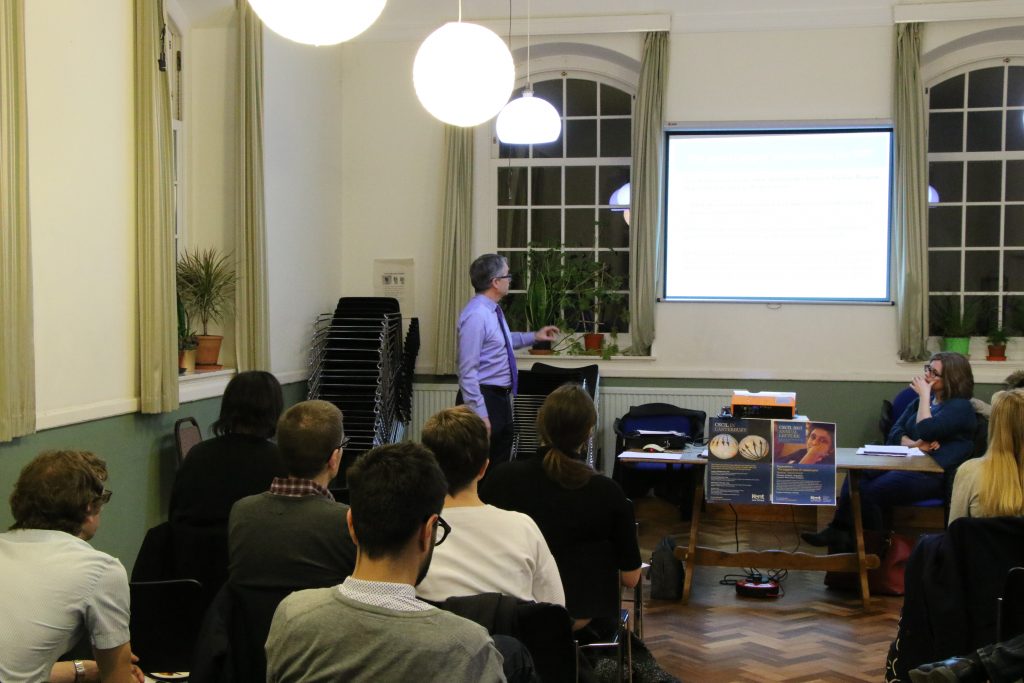A report by Eric Loefflad on a public lecture hosted by the Kent Centre for Critical International Law (CeCIL) in Canterbury
Kent Law School Professor Nick Grief reflected on his work as a member of a Nobel Peace Prize-nominated legal team that recently litigated a case before the International Court of Justice (ICJ) for the second CeCIL in Canterbury lecture held earlier this month.
The lecture, which took place at the Friends’ Meeting House in Canterbury, was entitled ‘Beyond Law’s Limits? Holding Nuclear-armed States to Account in the International Court of Justice.’
Nick’s team represented the Marshall Islands which brought claims against all the nuclear armed states regarding their responsibility to engage in good disarmament negations as mandated by the 1968 Nuclear Nonproliferation Treaty (NPT). Given that the Marshall Islands was subject to numerous nuclear weapons tests during its time as a United Nations trust territory administered by the US, it claimed a particular strong interest in nuclear-armed complying with their international obligations.
Towards this end, Nick explained how suit was brought against all states possessing nuclear weapons including both those who are signatories to the NPT (the US, the UK, France, Russia, China) and those that are not (India, Israel, North Korea, Pakistan). While only the official signatories were bound by the NPT, Nick’s team nonetheless argued that the non-signatory nuclear weapons-possessing states were nonetheless bound by obligations under customary international law. Ultimately, only the UK, India and Pakistan became official parties due to the ICJ statute provision regarding the Optional Clause on compulsory jurisdiction which required Nick’s team to adopt creative filing tactics.
In the proceedings themselves these parties objected on the grounds that no actual dispute existed. While the Court ultimately accepted this position and dismissed the case before the merits were reached, it was an extremely close decision that generated strong dissenting opinions. Furthermore, while the decision was rendered 9-7 in favour of India and Pakistan, it was 8-8 in regards to the UK; the differentiating factor being the UK’s status as a signatory of the NPT. In this instance the deciding vote was cast by ICJ President Ronnie Abraham of France (a nuclear-armed state) in favour of the UK. As such, the Marshall Islands claim in regards to the UK represents one of the few cases where a spilt decision had to be decided by the ICJ President. Interestingly enough, a spilt decision also occurred in another case largely viewed as betrayal of the Global South in the form of the 1960 South West Africa case where the Court ruled that Ethiopia and Liberia lacked standing to bring suit on the question of Apartheid South Africa’s occupation of the South West Africa which it acquired as a League of Nations mandate.

In concluding, Nick raised the point as to whether the question of nuclear weapons is simply ‘beyond law’s limits’ and points to Hersch Lauterpacht’s famous dictum that ‘international is the vanishing point of law.’ However, at the same time, Nick’s work in finding spaces for critical international legal practice certainly acted to raise awareness of the nuclear question, which is becoming all the more prescient in our current age of global uncertainty. In this capacity his description of how the ICJ actually functions as a procedural entity was certainly fascinating given that while most international lawyers are highly knowledgable of the substantive principles of ICJ rulings, few have in-depth knowledge on how to actually bring a case.
Moreover, it was great to hear to how Nick’s work with Quaker peace activists in the 1980s motivated his desire to engage in this type of activist practice. Here he recalls that many of these activists were delighted to discover international law as an avenue for asserting their project of seeking peace and justice beyond the rigid confines of the nation-state. For the critical international lawyer heavily focused on international law’s dark history and present limitations it is certainly refreshing to hear that such enthusiasm actually exists in the world. As such, Nick’s presentation of his rich insights in the Friends’ Meeting House could not have been more fitting and we are certainly grateful to them for providing CeCIL with a wonderful space for public engagement on important international issues.

